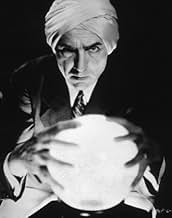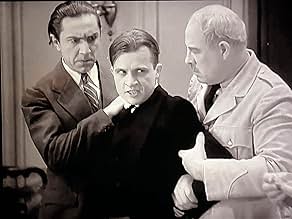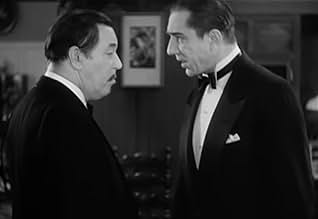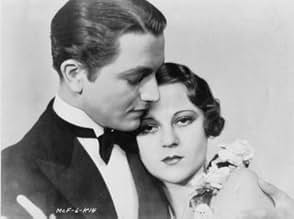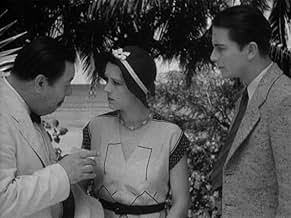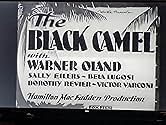AVALIAÇÃO DA IMDb
6,6/10
1,8 mil
SUA AVALIAÇÃO
Adicionar um enredo no seu idiomaThe unsolved murder of a Hollywood actor several years earlier and an enigmatic psychic are the keys to help Charlie solve the Honolulu stabbing death of a beautiful actress.The unsolved murder of a Hollywood actor several years earlier and an enigmatic psychic are the keys to help Charlie solve the Honolulu stabbing death of a beautiful actress.The unsolved murder of a Hollywood actor several years earlier and an enigmatic psychic are the keys to help Charlie solve the Honolulu stabbing death of a beautiful actress.
- Direção
- Roteiristas
- Artistas
Dwight Frye
- Jessop
- (não creditado)
C. Henry Gordon
- Huntley Van Horn
- (não creditado)
Robert Homans
- Chief of Police
- (não creditado)
Hamilton MacFadden
- Val Martino
- (não creditado)
Louise Mackintosh
- Housekeeper
- (não creditado)
Avaliações em destaque
As an avid Charlie Chan film buff..i,ve managed over the years to
obtain all of the "feature films"..The Black Camel is the earliest of all of the surviving films with Warner Oland portraying the great oriental slueth. This particular film was shot on location in Honolulu and is very entertaining..It also features Bela Lugosi as the fortune teller..Tarneverro..A fast moving story and a great cast of characters make this a "must have" for classic film buffs!
obtain all of the "feature films"..The Black Camel is the earliest of all of the surviving films with Warner Oland portraying the great oriental slueth. This particular film was shot on location in Honolulu and is very entertaining..It also features Bela Lugosi as the fortune teller..Tarneverro..A fast moving story and a great cast of characters make this a "must have" for classic film buffs!
With the character loosely based on Chang Apana (1887-1933), a police officer of Chinese heritage, author Earl Derr Biggers wrote six Charlie Chan novels between 1925 and 1932. House Without A Key and The Chinese Parrot were filmed as silents in 1926; Behind That Curtain was filmed, with Chan reduced to a minor character, in 1929. Starring various actors and filmed as individual pieces, none of the films can be described as entries in the series, but in 1931 Fox Studios cast Warner Oland in Charlie Chan Carries On--and with its success Fox Studios discovered a money spinner. Between 1931 and 1942 the studio would create no less than 27 Charlie Chan films, first starring Warner Oland and then starring Sidney Toler.
Charlie Chan Carries On has not survived. The earliest Chan film of the series that still exists is The Black Camel, which is based on the 1929 Diggers novel. The film follows the book quite closely. Shelia Fane (Dorothy Reiver) is an actress who has come to Hawaii to make a motion picture. She has fallen in love with a wealthy man and wants to marry--but she is troubled by something that has occurred in her past. She accordingly sends for psychic Tarneverro (Bela Lugosi), who warns her not to marry--but no sooner does she refuse the marriage than she is found dead, stabbed, in her beachfront home.
Like most of the later Chan films, The Black Camel has a remarkable cast that includes an unexpected number of notables. Bela Lugosi has already been mentioned, and other up-and-comers include Robert Young and character actor Dwight Frye. But this film is very early in the game, and Fox is still tinkering with style and characters; instead of being assisted by a son, Chan is saddled with inept junior officer Kashimo (Otto Yamaoka), a character drawn directly from the Biggers novel. The chemistry is not effective, and although most of the cast offers good performances much the same might be said of the project as a whole.
Part of the problem is the story itself. Apparently suggested by the 1920s murder of Hollywood director William Desmond Taylor, the plot itself is more than adequate, but the "how and why" details of the investigation are awkward. The script itself has an occasional zinger (at one point Chan warns Kashimo that "the wages of stupidity is search for new job!") but by and large it never manages to strike the balance between mystery and comedy for which the series was ultimately famous. It is also a film very much of the early sound era, which is to say visually static, and although it was partly filmed on Hawaiian location one sees little of the islands.
Overall, and while it has its moments, this is really a film best left to Chan fans, who will be interested to see the character at an early stage of development. Unfortunately, however, Chan fans will have a problem latching onto it: it is not presently available on either VHS or DVD and it is seldom broadcast.
Gary F. Taylor, aka GFT, Amazon Reviewer
Charlie Chan Carries On has not survived. The earliest Chan film of the series that still exists is The Black Camel, which is based on the 1929 Diggers novel. The film follows the book quite closely. Shelia Fane (Dorothy Reiver) is an actress who has come to Hawaii to make a motion picture. She has fallen in love with a wealthy man and wants to marry--but she is troubled by something that has occurred in her past. She accordingly sends for psychic Tarneverro (Bela Lugosi), who warns her not to marry--but no sooner does she refuse the marriage than she is found dead, stabbed, in her beachfront home.
Like most of the later Chan films, The Black Camel has a remarkable cast that includes an unexpected number of notables. Bela Lugosi has already been mentioned, and other up-and-comers include Robert Young and character actor Dwight Frye. But this film is very early in the game, and Fox is still tinkering with style and characters; instead of being assisted by a son, Chan is saddled with inept junior officer Kashimo (Otto Yamaoka), a character drawn directly from the Biggers novel. The chemistry is not effective, and although most of the cast offers good performances much the same might be said of the project as a whole.
Part of the problem is the story itself. Apparently suggested by the 1920s murder of Hollywood director William Desmond Taylor, the plot itself is more than adequate, but the "how and why" details of the investigation are awkward. The script itself has an occasional zinger (at one point Chan warns Kashimo that "the wages of stupidity is search for new job!") but by and large it never manages to strike the balance between mystery and comedy for which the series was ultimately famous. It is also a film very much of the early sound era, which is to say visually static, and although it was partly filmed on Hawaiian location one sees little of the islands.
Overall, and while it has its moments, this is really a film best left to Chan fans, who will be interested to see the character at an early stage of development. Unfortunately, however, Chan fans will have a problem latching onto it: it is not presently available on either VHS or DVD and it is seldom broadcast.
Gary F. Taylor, aka GFT, Amazon Reviewer
One of the very best of the early Charlie Chan films,'The Black Camel' features Warner Oland in his second outing as the Honolulu detective.With actual filming on Hawaiian locations(one of the few that did)the oriental sleuth tries to solve the murder of an unpleasant and very unpopular young actress,sifting through the usual baffling clues,and investigating one of the finest casts of suspects ever assembled for the series:Murray Kinnell,Victor Varconi,Robert Young,Richard Tucker and(fresh from their triumph in 'Dracula')Dwight Frye and Bela Lugosi!Viewers will also enjoy a look at Charlie's domestic life and huge family.In these earlier Chan films much of the basic plotlines followed the stories of Earl Derr Biggers' novels.
This is the earliest surviving Charlie Chan film to star Warner Oland as the detective (not counting 1929's BEHIND THAT CURTAIN, which only briefly featured Chan), an entertaining mystery nicely directed with stylish shooting and locations for such an early talkie. Chan is in Honolulu investigating the murder of a young movie actress and tries to untangle the relation between her death and a prior killing of another actor she used to know. Bela Lugosi, fresh after "Dracula" and riding its successes for a brief time in his career, is very good as a mystic involved in the mystery. A real treat of the picture comes whenever watching Lugosi and Oland interacting together. Dwight Frye, Bela's sidekick "Renfield" from "Dracula", also has a part as a butler. A very young Robert Young (of FATHER KNOWS BEST fame) is also on hand albeit in a rather insignificant part. This was the only time Chan was assisted by his bumbling sidekick Kashimo, and it's for the best, as this character is extremely irritating. *** out of ****
Primitive but fairly engaging Charlie Chan mystery, the first surviving film featuring Warner Oland as the genial Oriental detective: its major draws are the Hawaiian backdrop, the murder investigation centering around Hollywood elite and the interesting cast (including Bela Lugosi as a phony mystic, Dwight Frye as an impulsive butler named Jessup, and a pre-stardom Robert Young forming half of the bland romantic interest). Some of its greatest pleasure, then, derives from the interaction between Oland and Lugosi but also the former's relentless amiable mocking of his earnest but dim-witted assistant. The surprising denouement is not entirely plausible (though seemingly anticipating Hitchcock's STAGE FRIGHT [1950]) with a revelation concerning Lugosi's true identity, and where the presence of a second murderer is ultimately established. By the way, the film's title as explained by Chan is a metaphor for death when it arrives unexpectedly.
P.S. As was the case recently with HORROR ISLAND (1941), my second attempt at watching THE BLACK CAMEL proved more successful than the first where the playback had frozen completely three-quarters of the way in and left me curious about the eventual solution of the case!
P.S. As was the case recently with HORROR ISLAND (1941), my second attempt at watching THE BLACK CAMEL proved more successful than the first where the playback had frozen completely three-quarters of the way in and left me curious about the eventual solution of the case!
Você sabia?
- CuriosidadesOf the five Warner Oland Charlie Chan films based on the original Earl Derr Biggers novels, only this one still survives. The other four are believed to have been lost in one of two fires, one in the 1930s and the other in the 1960s.
- Erros de gravaçãoThe knife thrown at Chan when he discovers the scratches under the table couldn't possibly have come from the direction it is thrown from.
- Citações
Wilkie Ballou: Your theory's full of holes. It won't hold water!
Charlie Chan: Sponge is full of holes. Sponge holds water.
- ConexõesEdited into Who Dunit Theater: Charlie Chan Black Camel (2021)
Principais escolhas
Faça login para avaliar e ver a lista de recomendações personalizadas
- How long is The Black Camel?Fornecido pela Alexa
Detalhes
- Tempo de duração
- 1 h 11 min(71 min)
- Cor
- Proporção
- 1.20 : 1
Contribua para esta página
Sugerir uma alteração ou adicionar conteúdo ausente

